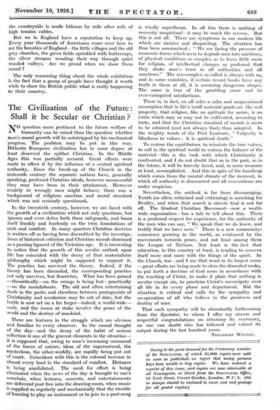The Civilization of the Future : Shall it be Secular
or Christian ?
NO question more pertinent to the future welfare of humanity can be raised than the question whether man's moral growth will be outstripped by his mechanical progress. The problem may be put in this way. Hitherto European civilization has in some degree at least deserved the epithet Christian. In the Middle Ages this was partially secured. Great efforts were made to effect it by the influence of a central spiritual authority. Since the break-up of the Church in the sixteenth century the separate nations have, generally speaking, professed Christian ideals, however unsuccessful they may have been in their attainment. However crudely or wrongly men might behave, there was a background of religious sanction and moral standard which was not seriously questioned.
In the twentieth century, however, we are faced with the growth of a civilization which not only questions, but ignores and even defies both these safeguards, and bases itself frankly and fearlessly on the twin foundations of cash and comfort. In many quarters Christian doctrine is written off as having been discredited by the investiga- tions of historical criticism and Christian morals dismissed as a passing figment of the Victorian age. It is interesting to notice that the growth of this secular outlook upon life has coincided with the decay of that materialistic philosophy which might be supposed to support it. The practice has survived the theory. Indeed, if the theory has been discarded, the corresponding practice not only survives, but flourishes. What has been gained -'-theoretically--on the swings is being lost—practically —on the roundabouts. The old and often entertaining duels in the parks and elsewhere between protagonists of Christianity and secularism may be out of date, but the battle is now set on a far larger—indeed, a world-wide— scale, and the issues at stake involve the peace of the world and the destiny of mankind.
There are features in the struggle which are obvious and familiar to every observer. In the casual thought of the day—and the decay of the habit of serious reflection is one of the gravest elements in the situation— it is supposed that, owing to man's increasing command of the forces of nature, ideas of the supernatural, the mysterious, the other-worldly, are rapidly being put out of court. Coincident with this is the colossal increase in almost every land in the standard of comfort. Distance is being annihilated. The need for effort is being eliminated when the news of the day is brought to one's armchair, when lectures, concerts, and entertainments are delivered post free into the drawing-room, when music IS supplied so regularly and mechanically that the trouble of learning to play an instrument or to join in a part-song is wholly superfluous. In all this there is nothing of necessity unspiritual—it may be much the reverse. But this is not all. There are symptoms in our modern life which are sinister and disquieting. The situation has thus been summarized: "We are facing the pressure of economic forces which seem to degrade men into machines, of physical conditions so complex as to leave little room for religion, of intellectual changes so profound that they shake man's trust in all authorities and all sanctions." The sex-complex so called is always with us, and in some countries, if certain recent books have any truth in them at all, it is assuming dangerous shapes. The same is true of the gambling craze and its ever-variegated satisfactions. There is, in fact, on all sides a calm and unquestioned assumption that in life's tariff material goods are the real property, that religion, like an aptitude for music, is an extra which may or may not be cultivated, according to taste, and that the Christian standard of morals is more to be admired (and not always that) than adopted. In. the weighty words of the Poet Laureate, "Vulgarity is blindness to values; it is spiritual death." To restore the equilibrium, to reinstate the true values, to call in the spiritual world to redress the balance of the material—this is the task with which Christianity is confronted, and I do not doubt that as in the past, so in the future, it will be bravely faced, and, in some measure at least, accomplished. And this in spite of the handicap which comes from the mental climate of the moment, in which all authority is discounted and all conventions are under suspicion. Nevertheless, the outlook is far from discouraging. Youth (so often criticized and criticizing) is searching for Reality, and when that search is sincere God is not far off. The Student ' Christian Movement—now a world- wide organization—has a tale to tell about this. There is a profound respect for experience, for the authority of the men who can say, "We speak that we do know, and testify that we have seen." There is a new community- conscience growing in the world, as evidenced by the movements towards peace, and not least among them the League of Nations. Not least is the fact that education, in this country at least, is tending to concern itself more and more with the things of the spirit. In the Church, too—and I use that word in its largest sense —great efforts are being made to dose the disunited ranks, to put forth a doctrine of God more in accordance with the teaching of Christ, to make it plain that nothing is secular except sin, to proclaim Christ's sovereignty over all life in its every phase and department. But the situation is critical and calls for the sympathy and co-operation of all who believe in the greatness and destiny of man. That such sympathy will be abundantly forthcoming from the Spectator, to whom I offer my sincere and respectful congratulations on attaining its centenary, no one can doubt who has followed and valued its output during the last hundred years.
THEODORE WINTON.












































 Previous page
Previous page